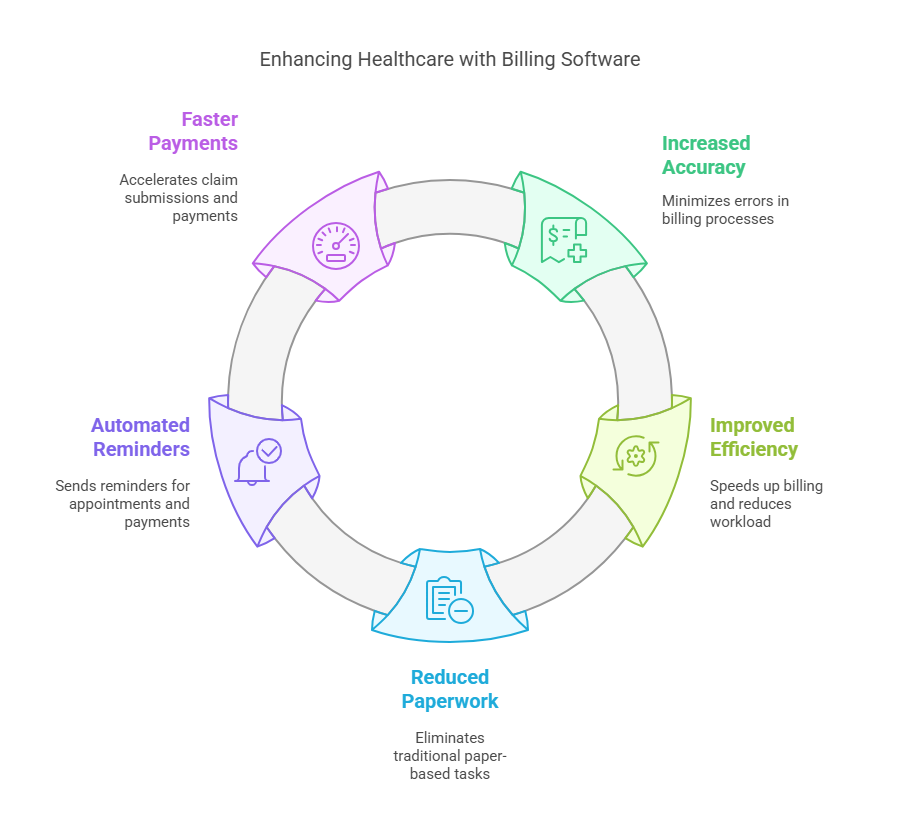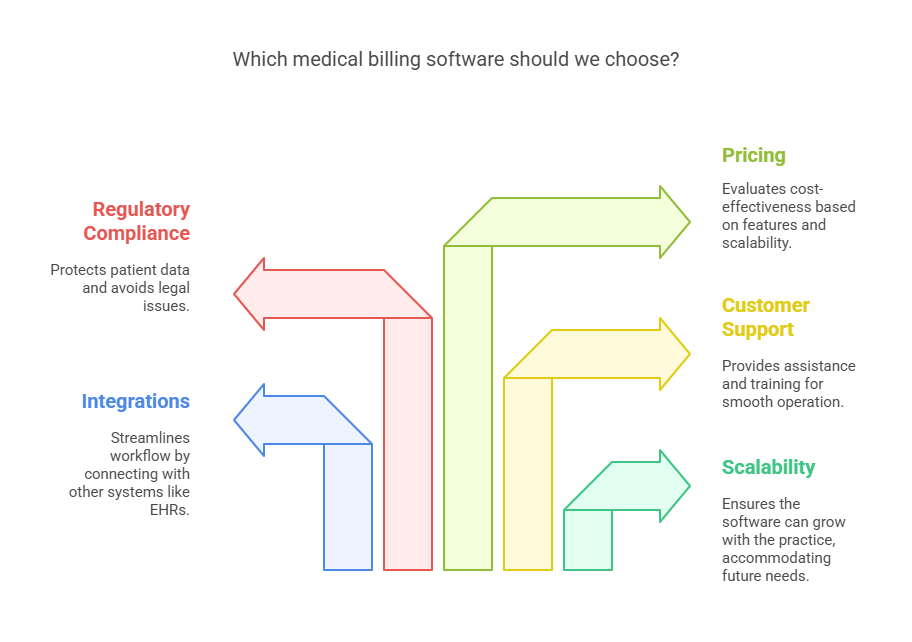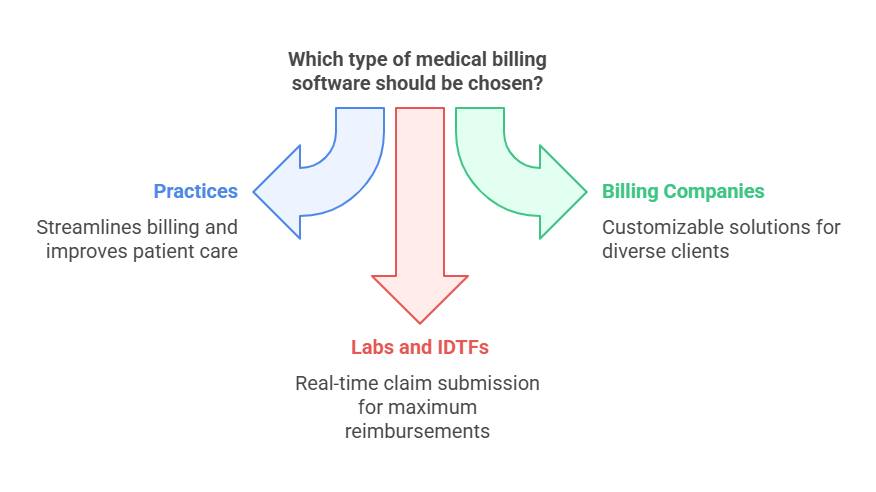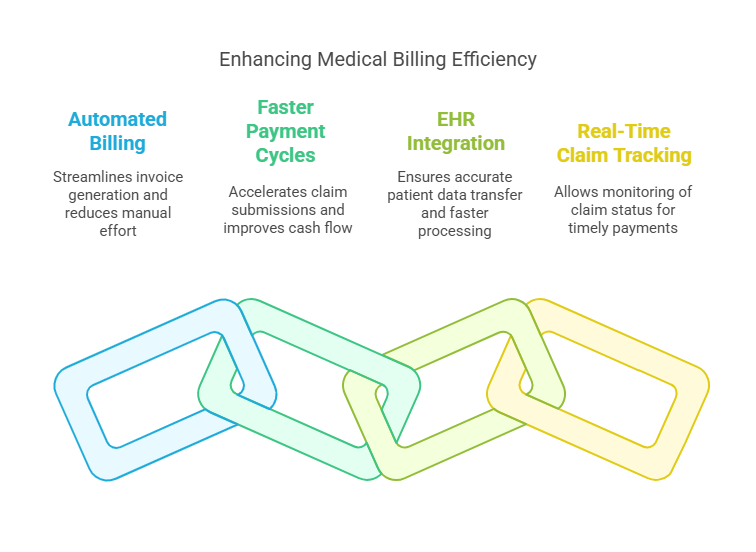The Best Medical Billing Software: Improve Efficiency and Accuracy
Medical billing software is an indispensable tool for modern healthcare practices, improving both efficiency and accuracy in the billing process. It automates invoicing, payment collection, and claims management, reducing manual errors and streamlining administrative tasks. As healthcare systems evolve and compliance standards like HIPAA become more stringent, the need for secure, reliable, and integrated billing solutions is more important than ever. This article explores the key benefits, features, and top medical billing software options to help healthcare professionals choose the best solution for their needs.

What is Medical Billing Software?
Medical billing software is designed to automate the billing process, ensuring that healthcare providers can quickly and accurately manage payments and claims. It integrates with other systems like practice management and accounting software to create a seamless workflow. This integration enables healthcare practices to handle billing tasks efficiently, improving accuracy and reducing human error. Medical billing software also ensures compliance with industry regulations like HIPAA, which govern how patient payment information is processed.
By automating tasks such as invoicing and claim generation, medical billing software allows healthcare providers to focus more on patient care, improving overall operational efficiency. Whether used in small clinics or large healthcare facilities, medical billing software helps maintain a smooth billing operation by automating administrative tasks and improving cash flow.
Benefits of Using Medical Billing Software
The adoption of medical billing software offers several key benefits for healthcare practices. One of the most significant advantages is the ability to streamline administrative tasks, allowing healthcare professionals to focus on patient care. Here are some specific benefits of using medical billing software:
Increased Accuracy: By automating the billing process, medical billing software minimizes human errors and ensures that charges are correct.
Improved Efficiency: Automation speeds up the billing process and reduces the need for manual intervention, cutting down on administrative workload.
Reduced Paperwork: With medical billing software, much of the traditional paperwork involved in billing is eliminated, making the process more eco-friendly and organized.
Automated Reminders: The software can send reminders to patients for upcoming appointments or unpaid bills, helping to reduce missed appointments and outstanding payments.
Faster Payments: Automated systems speed up claim submissions and payments, improving cash flow for healthcare providers.

Key Features of Medical Billing Software
Medical billing software offers a range of features designed to improve the efficiency and accuracy of billing and claims processing. Here are some of the most important features to look for:
End-to-End Claim Tracking: Medical billing software tracks claims from submission to payment, allowing providers to monitor their financial health and follow up on any claims that need attention.
User-Friendly Reporting: A good medical billing software system will include an easy-to-use reporting and dashboard system that provides financial health insights, helping healthcare providers make informed decisions.
Integrated Billing and Practice Management: Integrated software solutions allow for seamless management of both medical billing and other practice management functions, such as scheduling and patient records.
Customizability: Medical billing software should offer flexible solutions that can be tailored to meet the specific needs of a practice or billing company.
EHR Integration: Integration with Electronic Health Records (EHRs) enables secure sharing of patient data and improves the accuracy of billing information.
Choosing the Best Medical Billing Software
When selecting medical billing software, it's important to consider several factors to ensure the software meets the unique needs of your healthcare practice. Key considerations include:
Scalability: As your practice grows, your billing software should be able to grow with you. Look for solutions that offer scalability, allowing for easy upgrades as your needs evolve.
Integrations: Ensure that the software integrates seamlessly with other systems, such as Electronic Health Records (EHRs) and accounting software, for a more streamlined workflow.
Customer Support: Good customer support is essential for troubleshooting issues and ensuring smooth operation. Look for vendors that offer training, support, and responsive customer service.
Regulatory Compliance: The software must comply with healthcare regulations, including HIPAA, to protect patient data and avoid legal issues.
Pricing: The cost of medical billing software can vary greatly, so it’s important to evaluate the pricing structure based on the features and scalability you need.

Top Medical Billing Software Options
Several medical billing software options are available, each offering unique features and solutions. Below are some of the top software providers:
CureMD: CureMD offers a comprehensive medical practice management solution that includes billing, scheduling, and EHR integration, making it ideal for smaller practices that need an all-in-one solution.
athenahealth: Athenahealth is a cloud-based solution that provides integrated medical billing software along with practice management tools. It allows practices to streamline their billing process while improving patient care.
DrChrono: DrChrono automates medical billing, patient documentation, and appointment scheduling. This software is ideal for practices that need a simple, user-friendly system for managing all aspects of their medical practice.
Medical Billing Software for Specific Needs
Different types of medical practices and businesses may require specialized features in their billing software. Here’s a breakdown of software tailored to specific needs:
Medical Billing Software for Practices: Designed to streamline the billing process and improve patient care, this software is ideal for small to mid-sized practices.
Medical Billing Software for Billing Companies: Billing companies often need customizable solutions that can handle a wide variety of clients. This software allows for smoother transitions and fewer errors.
Medical Billing Software for Labs and IDTFs: This software is designed to provide real-time claim submission, maximizing reimbursements for labs and Independent Diagnostic Testing Facilities (IDTFs).

Implementation and Training
When selecting medical billing software, it’s crucial to consider the implementation and training process. Look for software providers that offer comprehensive training programs to ensure that staff can use the software effectively. The transition to a new system should be as seamless as possible, so choose a vendor that offers ongoing support and customization options to meet your practice’s specific needs.
Security and Compliance
Security is a major concern when choosing medical billing software. HIPAA compliance is a must to protect patient information and avoid potential legal issues. Be sure to evaluate the software’s security features, including encryption and data protection. Look for certifications like SureScripts Certified, Gold Quality Solution, and EHNAC HNAP-EHN Accredited to ensure the software meets industry standards for security and compliance.
Pricing and Cost
The pricing of medical billing software can vary widely depending on the features and level of customization required. It’s essential to evaluate the cost of each solution and determine if it fits within your budget. Be sure to look for software that offers flexible pricing plans, and consider the scalability of the system as your practice grows.
Medical Billing Software for Improved Efficiency
One of the primary advantages of using medical billing software is its ability to improve efficiency. Here are some of the ways it contributes to enhanced operational performance:
Automated Billing: The software automates the process of generating and sending invoices, reducing manual workload and increasing billing accuracy.
Faster Payment Cycles: By accelerating claim submissions and payments, medical billing software improves cash flow and financial performance.
Integration with EHR Systems: Medical billing software can integrate with EHR systems, ensuring that patient information is accurately transferred and claims are processed faster.
Real-Time Claim Status Tracking: With real-time analytics, practices can monitor the status of claims and follow up as needed to ensure timely payments.

Conclusion
Medical billing software is an essential tool for healthcare practices, offering a way to streamline administrative tasks, improve billing accuracy, and boost overall efficiency. For those pursuing a career in this field, obtaining a medical billing and coding certification—such as the one offered by AMBCI (American Medical Billing and Coding Institute)—can enhance their understanding and use of such software. By carefully evaluating key features like scalability, integrations, security, and pricing, healthcare professionals can select the best software to meet their needs. The implementation of medical billing software not only improves operational workflows but also allows healthcare providers to prioritize patient care, ultimately benefiting both patients and providers.
6 Lesser-Known Facts About Medical Billing Software
Increased Demand for Remote Medical Billing:
Automated Coding Features:
Cloud-Based Solutions:
Impact on Reimbursement Rates:
EHR Integration Improves Billing Accuracy:
Customizable Solutions for Different Specialties:
FAQs about Medical Billing Software
-
CureMD and DrChrono are ideal for small practices, offering a user-friendly interface and integration with other systems.
-
Yes, reputable medical billing software providers ensure HIPAA compliance to protect patient information.
-
Most modern medical billing software options offer EHR integration, ensuring seamless transfer of patient data.
-
The cost varies depending on the features and customization needed. Some software options offer flexible pricing models based on the size of the practice.
-
Yes, medical billing software can help reduce claim denials by automating the billing and claim submission process, ensuring accuracy.
